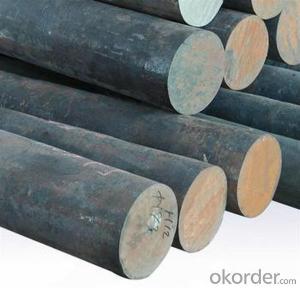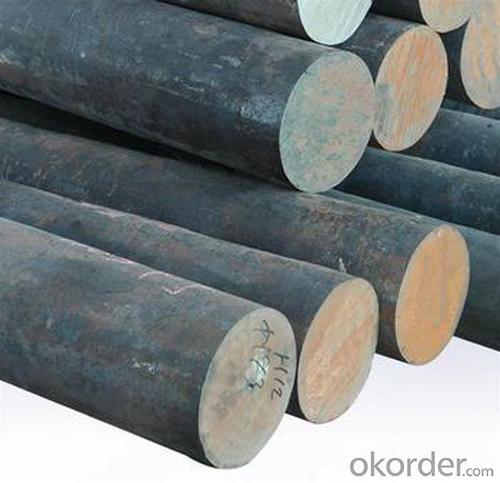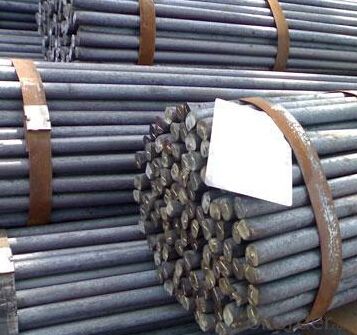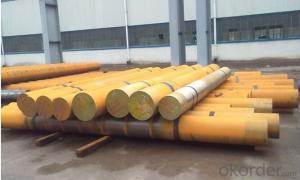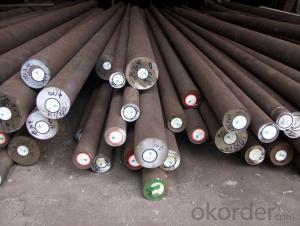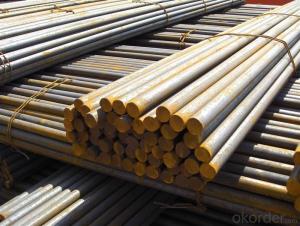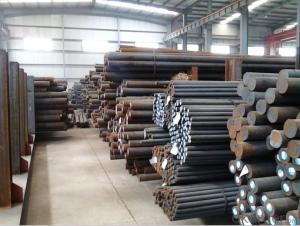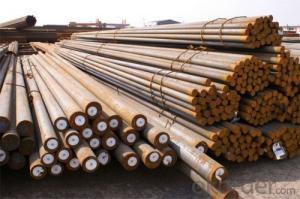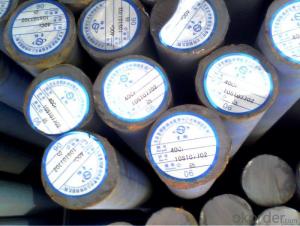Steel 4Cr13 Alloy Steel Round Bar Special Steel
- Loading Port:
- China main port
- Payment Terms:
- TT OR LC
- Min Order Qty:
- 25 m.t.
- Supply Capability:
- 10000 m.t./month
OKorder Service Pledge
OKorder Financial Service
You Might Also Like
Specification
Chemical Composition(GB)%
| C | Si | Mn | Cr | P | S |
| 0.4 | 0.5 | 0.7 | 13 | ≤0.030 | ≤0.030 |
Standard
| GB | ASTM | DIN | JIS |
| 4Cr13 | 4.2 | 1.2083 | 420J2 |
Available Size
| Rolled plate | 12-120mm*720mm*6000mm | ||
| Module | 130-400mm*1000mm*6000mm | ||
Heat Treatment
| Processing | Temperature ℃ | Hardness |
| Anneal | 750-800 | ≤235HB |
| Quenching | 1050-1100 | ≥50HRC |
| Tempering | 200-300 | ≥50HRC |
Characterstics
| 1.High corrosion resistance and mirror performance | |||||
| 2.Higher strength and abrasion resistance |
Applications:
Suitable for precise dies with super mirror performance and abrasion resistance,camera components,optical lens
Product Show:


1, Your advantages?
professional products inquiry, products knowledge train (for agents), smooth goods delivery, excellent customer solution proposale
2, Test & Certificate?
SGS test is available, customer inspection before shipping is welcome, third party inspection is no problem
3, Payment Terms?
30% TT as deposit and 70% before delivery.
Irrevocable L/C at sight.
4, Trading Terms?
EXW, FOB, CIF, FFR, CNF
6, After-sale Service?
WE provides the services and support you need for every step of our cooperation. We're the business partner you can trust.
For any problem, please kindly contact us at any your convenient time.
We'll reply you in our first priority within 24 hours.
- Q: How does special steel perform in extreme environments?
- Special steel is specifically designed to perform exceptionally well in extreme environments. It has superior resistance to corrosion, high temperatures, and pressure, making it highly reliable and durable. This type of steel can withstand harsh conditions such as extreme cold, intense heat, and corrosive chemicals, ensuring optimal performance and longevity even in the most challenging environments.
- Q: How does special steel perform in cryogenic fatigue resistance?
- The exceptional performance of special steel lies in its ability to resist cryogenic fatigue. Cryogenic fatigue occurs when a material's structural integrity deteriorates under repeated loading and unloading at extremely low temperatures. Special steel, also known as high-performance or high-strength steel, surpasses conventional steels in its resistance to cryogenic fatigue. The enhanced cryogenic fatigue resistance of special steel can be attributed to its distinctive composition and microstructure. Special steels are typically alloyed with elements like nickel, chromium, and molybdenum, which enhance their mechanical properties, including strength and toughness, even at low temperatures. These alloying elements enable the steel to maintain its integrity and resist the initiation and propagation of cracks, which are common failure mechanisms in cryogenic environments. Moreover, the manufacturing process of special steel meticulously controls its microstructure to ensure optimal performance in cryogenic conditions. The fine-grained structure of special steel diminishes the susceptibility to fatigue cracks by promoting a more evenly distributed stress and strain throughout the material. This prevents the formation of localized stress concentrations, which can lead to crack initiation and subsequent failure. Apart from its composition and microstructure, special steel undergoes rigorous testing and quality control measures to guarantee its cryogenic fatigue resistance. Various industry standards and specifications, such as the ASTM E466 test method, exist to evaluate the performance of special steel in cryogenic conditions. These tests simulate the cyclic loading and unloading that the material may encounter in cryogenic environments and provide valuable data on its fatigue life and durability. In conclusion, special steel exhibits exceptional resistance to cryogenic fatigue due to its unique composition, controlled microstructure, and meticulous testing. Its ability to endure repeated loading and unloading at extremely low temperatures makes it the preferred choice for applications in industries like aerospace, energy, and cryogenic storage.
- Q: How does special steel perform in terms of chemical resistance?
- Special steel typically performs very well in terms of chemical resistance. Its composition and properties make it highly resistant to corrosion and oxidation, allowing it to withstand exposure to various chemicals without significant degradation. Additionally, special steel can be specially alloyed or treated to enhance its chemical resistance even further, making it an excellent choice for applications in industries such as oil and gas, chemical processing, and marine environments.
- Q: What are the emerging trends in the special steel industry?
- Some emerging trends in the special steel industry include the increasing demand for high-strength and lightweight materials, the growing adoption of advanced manufacturing technologies such as 3D printing, the focus on sustainability and environmental impact reduction, and the rise of electric vehicles driving the need for specialized steel grades. Additionally, there is a shift towards customization and tailored solutions to meet specific industry requirements.
- Q: How does special steel contribute to the manufacturing of medical implants?
- Special steel plays a vital role in the manufacturing of medical implants by offering superior strength, corrosion resistance, and biocompatibility. These properties are crucial for ensuring the longevity and functionality of implants, allowing them to withstand the harsh conditions within the human body. Additionally, special steel can be shaped and machined into complex forms, enabling the production of intricate and customized implants to meet the specific needs of patients. Overall, special steel is essential for producing high-quality and reliable medical implants that enhance patient outcomes and improve their quality of life.
- Q: What are the different medical grades of special steel?
- There are various medical grades of special steel used in the healthcare industry, including 316L, 316LVM, 304L, and 17-4PH. Each grade has specific properties that make it suitable for different medical applications, such as surgical instruments, implants, and medical devices. These grades are carefully manufactured to meet strict standards of corrosion resistance, biocompatibility, and mechanical strength required in medical settings.
- Q: What's the difference between special steel and ordinary steel?
- Special steel is a kind of steel with special chemical composition (alloying), produced by special process, special organization and performance, and can meet special requirement.
- Q: What are the main applications of special steel in the semiconductor industry?
- Special steel is widely used in the semiconductor industry for various applications. One of the main applications is in the manufacturing of wafer handling components such as vacuum chucks, reticle stages, and load ports. Special steel's high strength, corrosion resistance, and precision machining capabilities make it ideal for these critical components that require excellent dimensional stability and reliability. Additionally, special steel is also used in the construction of cleanroom equipment, such as gas cabinets, exhaust systems, and process tools, where its resistance to chemical and thermal stress is highly valued. Overall, special steel plays a crucial role in ensuring the efficiency, accuracy, and safety of semiconductor manufacturing processes.
- Q: What are the specific requirements for special steel used in the electronics industry?
- In order to meet the unique demands of the electronics industry, special steel must fulfill certain requirements. These requirements include: 1. To protect electronic components from environmental factors like moisture, humidity, and chemical exposure, special steel used in the electronics industry must have high corrosion resistance. 2. Efficient transmission of electricity within electronic devices relies on the excellent electrical conductivity exhibited by the steel. This property is crucial for the proper functioning of electronic components. 3. Depending on the application, special steel used in the electronics industry must possess specific magnetic properties. Some electronics require non-magnetic steel to avoid interfering with sensitive magnetic components, while others may need specific magnetic properties for magnetic shielding or as core material in transformers. 4. To ensure the longevity and reliability of electronic components, the steel must possess high strength and durability, enabling it to withstand the stresses and strains encountered during the manufacturing process and throughout the lifespan of the electronic device. 5. Special steel used in the electronics industry must be able to withstand high temperatures without compromising its structural integrity or electrical properties. This is particularly important in electronic devices that generate heat, such as computer processors or industrial control systems. 6. The steel must be easily formable and machinable to enable efficient manufacturing processes and the production of intricate electronic components. This allows for the fabrication of complex shapes and designs required in the electronics industry. 7. To ensure optimal performance and reliability of electronic devices, special steel used in the electronics industry should have minimal impurities and contaminants. High purity steel guarantees the absence of unwanted elements that may cause electrical or chemical interference. Meeting these specific requirements for special steel used in the electronics industry is crucial for producing high-quality and reliable electronic devices. By fulfilling these requirements, the steel can withstand the challenges and environmental conditions unique to the electronics industry, ultimately contributing to the overall performance and functionality of electronic devices.
- Q: How is high-strength steel used in the automotive industry?
- High-strength steel is extensively used in the automotive industry for various applications. It is commonly used for manufacturing car frames, body panels, and structural components due to its exceptional strength, durability, and lightweight properties. This type of steel enhances the overall safety and performance of vehicles while reducing their weight, thereby improving fuel efficiency and reducing emissions. High-strength steel also provides enhanced protection in case of accidents by effectively absorbing and distributing energy during collisions.
Send your message to us
Steel 4Cr13 Alloy Steel Round Bar Special Steel
- Loading Port:
- China main port
- Payment Terms:
- TT OR LC
- Min Order Qty:
- 25 m.t.
- Supply Capability:
- 10000 m.t./month
OKorder Service Pledge
OKorder Financial Service
Similar products
Hot products
Hot Searches
Related keywords
